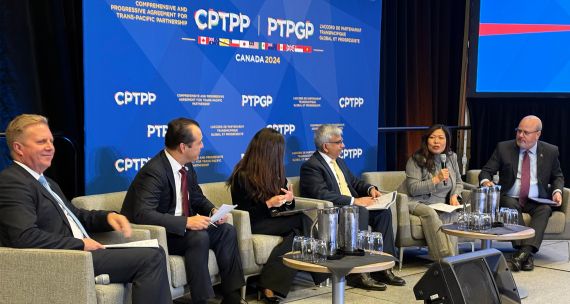If you believe the recent wave of op-eds and opinion columns, we are about to enter a protectionist age. The common people have finally said “enough” to trade agreements that have hollowed out the middle class, generated income inequality and prompted runaway deregulation. The out-of-touch elites and their globalist vision have been proven wrong – the day of reckoning is upon us.
The only problem with this backlash story is the lack of data behind it.
Sure, if you look around, you can find some evidence to support a popular trade revolt. In America, Donald Trump and Bernie Sanders both thunder against trade agreements, and Hillary Clinton – a one-time proponent of such agreements – has changed her tune on the Trans-Pacific Partnership. In Britain, voters chose to exit the European Common Market.
These are the anecdotes that have launched a thousand think pieces. “The Consensus Crumbles,” proclaimed The Economist. A New York Times op-ed writer went a bit sunnier: “The Era Of Free Trade Might Be Over. That’s A Good Thing.”
It’s not just the United States and British commentariat that are telling this story. Writing for Maclean’s, Evan Solomon wondered if we’ve hit “peak globalization” and warned that “the protectionist movement is on the rise, even in Canada.”
Let’s step back and look at some facts.
Yes, prominent American politicians have recently soured on trade agreements. The same is not true of the American public. Granted, compared to most countries, Americans have always had a protectionist edge – it’s part of the luxury afforded to those who live in one of the least trade-dependent industrialized countries in the world.
Gallup has been tracking American attitudes toward trade agreements for decades. The percentage of Americans who saw foreign trade as a “threat” peaked at 52 per cent after the 2008 financial crash. By 2016, just 33 per cent viewed trade as a threat, a historic low.
We do not find a protectionist wave in the Pew Research Center data either. In 2009, 34 per cent of Americans said trade agreements with other countries were “a bad thing.” By 2016, it was 39 per cent. At worst, this is a protectionist ripple.
In Canada, the story makes even less sense. The Asia Pacific Foundation of Canada has been conducting surveys on Canadian attitudes toward trade and trade agreements for years. Our question on support for trade agreements in general has turned into a boring survey item for us because it generates so little disagreement and change: In 2014, 68 per cent said they generally support free-trade agreements. It was 66 per cent in 2015 and 75 per cent in 2016.
Mr. Solomon and others have pointed to a recent Angus Reid Institute poll on support for the North American free-trade agreement. When given a range of options about what to do with NAFTA (for example, “Strengthened and expanded” and “Done away with entirely”), 34 per cent responded, “Renegotiated.” One could read this as soft support for NAFTA.
Of course, this is nothing new, even for Angus Reid’s polling. In 1993, they found that 58 per cent of Canadians opposed the continental trade agreement. In 2014, they found an almost even split on whether the agreement had been beneficial or harmful. You have to squint hard to find any protectionist trend.
Meanwhile, Canadians are overwhelmingly supportive of a free-trade agreement with the European Union. In our recent APF Canada poll, 79 per cent supported such an agreement, and only 14 per cent opposed it. When we polled on support for an agreement with South Korea before that deal was concluded, there was an even 41-41 split. Now that the agreement has been signed and implemented, the split is gone, and 52 per cent said it was a “good idea,” versus 17 per cent who said it was a “bad idea.”
There has not been a widespread public revolt against trade in Canada. And even in the land of Donald Trump and Bernie Sanders, the signs are weak at best.
What there has been is a revolt of some politicians and commentators. Looking for an answer to the changing economic landscape, trade looks like a plausible culprit. But politicians such as Mr. Trump and Mr. Sanders are not following public opinion – they are trying to shape it. And many columnists seem happy to indulge them.
For supporters of trade, the problem is not the present existence of a public backlash. Rather, it’s that the negative messaging from on high may move public opinion if left unchallenged.
The case for trade, which includes the need for larger markets, the benefits of lower-priced goods and the opportunistic inefficiency of tariffs, is the same as it’s always been. A protectionist Canada will be a poorer, more isolated Canada. Supporters should not shy from making this case.
This piece was first published in the Globe and Mail on August 3, 2016



